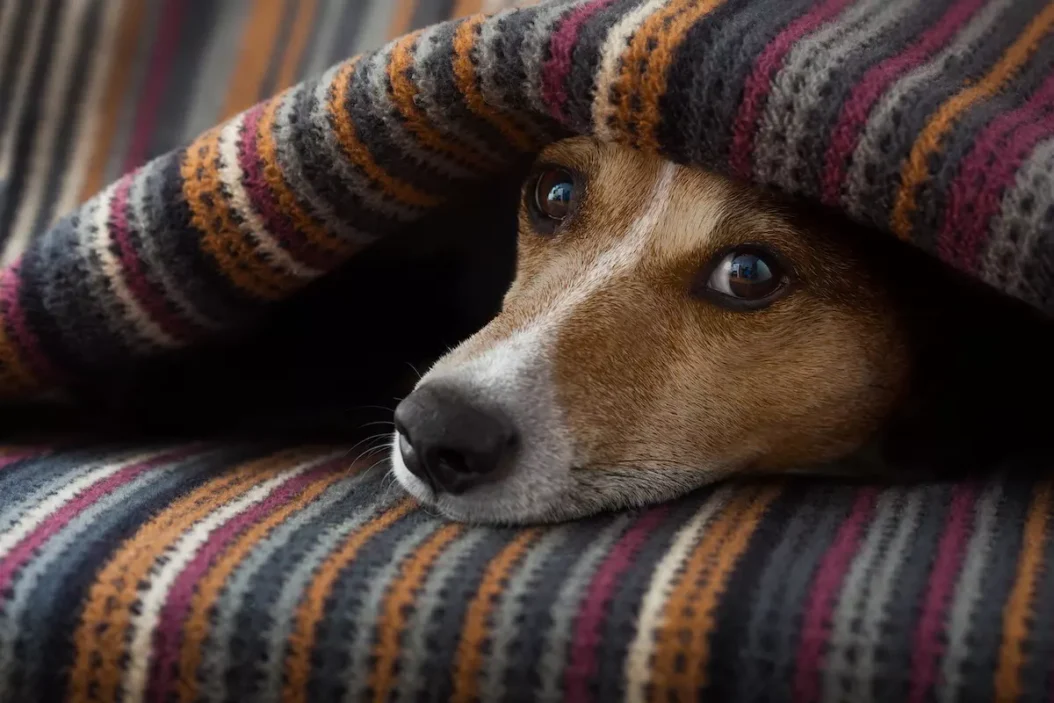Press Release




- For Immediate Release:
- Contact:
- Wayne Pacelle, president
- 202-420-0446
- Email Wayne here
Animal Wellness Groups Offer Tips and Advice for Keeping Pets Safe and Sound this Fourth of July
Washington D.C. — Animal Wellness Action, the Center for a Humane Economy, and the Animal Wellness Foundation, along with certified animal behavior consultant Steve Dale, wish to remind pet guardians on this Fourth of July that fireworks are not festive or enjoyable for our furry companions, and to ask people to please think about animal wellbeing as they plan their celebrations at home or in the community.

It’s key to know that dogs in particular have very sensitive hearing, and what sounds loud to us is even louder for them. This includes exploding fireworks overhead. It can actually be terrifying.
“It’s not that pets aren’t patriotic,” says Steve Dale, host of nationally syndicated radio shows Steve Dale’s Pet World and The Pet Minute. “It’s that the loud sounds are unpredictable and without explanation. They don’t get that email saying, ‘this is supposed to be a celebration.’ Actually, it’s adaptive to run or hide from very loud unexplained noises for any species, including our own.”
“The kindest thing you can do for your pets during loud celebrations is to put them in a safe place with their favorite toys and blanket, and a bowl of water. Dull outside noises with melodic background music to create a soothing environment. It’s a kindness you’ll never regret,” says Jennifer Skiff, Director of International Programs for Animal Wellness Action and Center for a Humane Economy and author of The Divinity of Dogs.
On Independence Day week, as people like to get a jump start on launching neighborhood fireworks, petrified pups will tend to flee and jump over (or dig under) fences. It is never a good idea to tether a dog, and especially not on this holiday, because some dogs have choked themselves in a desperate attempt to escape the sounds of fireworks.
As for wildlife, birds often become disoriented, and nesting birds may leave their chicks. And just as dogs/cats often panic, so do wild animals.
Tips to keep your pets safe and emotionally well this Fourth of July week:
- Leave your pets at home if you head out to celebrations with fireworks. Do not take them to fireworks displays.
- Plan to keep dogs and cats indoors before and after the Fourth of July. This is because of early and post-holiday neighborhood fireworks.
- Before you leave for a celebration, take your dog for a walk. Close windows and curtains/blinds to prevent animals from going through screens or breaking glass. Turn on soothing music or a happy movie to diffuse the sound of the fireworks.
- Make sure your pets have identification, preferably a microchip and tagged collars in case they accidentally get out and become lost.
- For small animals kept in outdoor enclosures, like rabbits, make sure they have plenty of hay to burrow in. Partially cover enclosures to reduce sound.
- Experts recommend you secure fencing and remain home with horses, donkeys, and ponies.
- Ask your city or town to invest in “silent” fireworks, laser, or drone displays. They’re just as spectacular to see!
- If your pet has bad separation anxiety, ideally stay at home with him/her.
- If you know that your pet is going to be panicked, even inconsolable based on previous years, it won’t get any better this year. So please contact your veterinarian early about a pharmaceutical aid and NEVER take a guess at what might work from your own medicine cabinet, or you may find yourself in the ER. If a drug makes them sleepy, that may be a good thing, but ask the veterinarian about side effects.
- Some pets can deal with the noise by hiding under a bed, in a closet or even a bathtub, so let them be. You can help some mildly distressed pets by putting them in a room where you pull down the shades, pump up calming music or turn on the television, and attempt to distract with a food puzzle or playing with an interactive cat or dog toy.
Tips in the event your pet becomes lost during fireworks:
- Create posters of your dog/cat with photos, name, and your phone number. Offer a reward. Experts advise that posters with rewards motivate people to join the search.
- Take your posters to all local veterinarians, and to the local pound and/or shelter. Go in-person to shelters and pounds and ask to personally see all animals. Do not rely on front office staff to tell you if your pet is in their facility. They’re busy and often don’t know.
- Post on social media and include the vicinity where your pet was last seen. Keep updating your post. Make your plea personal by telling people how much your pet means to you.
According to Skiff, who has run animal shelters in Australia and the United States: “The busiest intake day at shelters and pounds is typically the day after celebrations involving fireworks. In the United States, it’s the 5th of July. The unexpected and loud sound of fireworks is frightening, and many animals including dogs, cats, horses, farm animals, and wild animals take flight when they’re afraid. This leads to many being hit by cars and suffering other injuries. Sadly, and I’ve seen it too often, dogs that aren’t microchipped or found with collars that include identification tags, are often not reunited with their families. The best way to keep your pet safe is to protect them, in advance.”
Steve Dale, CABC (certified animal behavior consultant), is host of two national pet radio shows, and on WGN Radio, Chicago. He is a contributor to Decoding Your Dog and Decoding Your Cat as well as a frequent speaker at veterinary and animal welfare meetings, www.stevedale.tv.
Center for a Humane Economy is a Washington, D.C.-based 501(c)(3) whose mission is to help animals by helping forge a more humane economic order. The first organization of its kind in the animal protection movement, the Center encourages businesses to honor their social responsibilities in a culture where consumers, investors, and other key stakeholders abhor cruelty and the degradation of the environment and embrace innovation as a means of eliminating both. The Center believes helping animals helps us all. Twitter: @TheHumaneCenter
Animal Wellness Action is a Washington, D.C.-based 501(c)(4) whose mission is to help animals by promoting laws and regulations at federal, state and local levels that forbid cruelty to all animals. The group also works to enforce existing anti-cruelty and wildlife protection laws. Animal Wellness Action believes helping animals helps us all. Twitter: @AWAction_News
Animal Wellness Foundation is a Los Angeles-based private charitable organization with a mission of helping animals by making veterinary care available to everyone with a pet, regardless of economic ability. We organize rescue efforts and medical services for dogs and cats in need and help homeless pets find a loving caregiver. We are advocates for getting veterinarians to the front lines of the animal welfare movement; promoting responsible pet ownership; and vaccinating animals against infectious diseases such as distemper. We also support policies that prevent animal cruelty and that alleviate suffering. We believe helping animals helps us all.